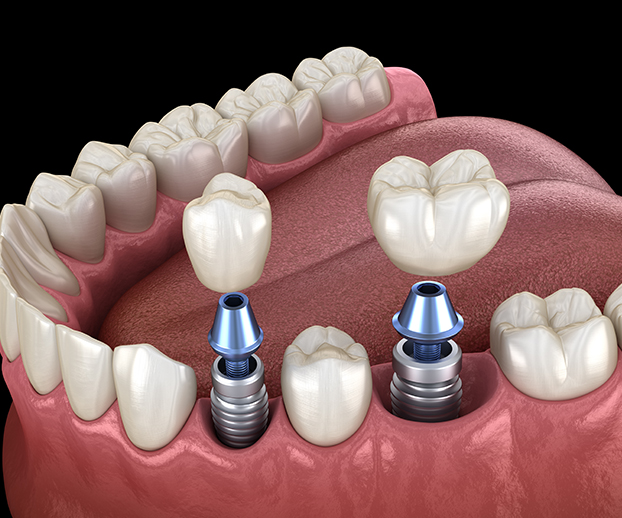PostOp Care for Dental Implants

Post-Operative Care Instructions for Dental Implants
A Summary of Post-Operative Care for Dental Implants
The recovery time for dental implants varies from patient to patient, but it is typically shorter than many people think. By maintaining good oral hygiene and following dietary restrictions, patients can expect a smooth and comfortable recovery. Our team can recommend soft foods to prevent irritation around the implant site and provide guidance on oral health practices to prevent inflammation.
We are here to explain the recovery process, both initially and in the long term, so patients are prepared for what to expect after getting dental implants. While each patient's experience may differ, there are common side effects and precautions to be aware of during post-operative care. It is important to be aware of potential issues such as infection, gum recession, and implant loosening, as reported by Medical News Today. Patients should also inform our team of any medications or chronic conditions that could impact their recovery.
“With good oral hygiene and specific dietary restrictions, patients can count on an efficient and comfortable recovery.”
How Dental Bridges Function Alongside Dental Crowns
“The dentist must reshape the two abutment teeth to secure the dental bridge.”
The Process of Recovery
The recovery process occurs in stages, with many individuals able to fully recover in as little as four weeks. Patients may need to take a few days off from work and physical activities during post-operative care when swelling and discomfort are at their peak. Most patients typically resume normal eating habits within two weeks, around the same time when swelling, bleeding, and overall discomfort begin to diminish.
While there is generally minimal discomfort with dental implants, the side effects may vary slightly from patient to patient. However, there are some common side effects that patients can anticipate during post-operative care. Some of the more prominent side effects include:
- Pain and Swelling: The dentist will provide methods to minimize discomfort, but expect some pain and gum swelling during the first few weeks of post-operative care.
- Minor Bleeding: Although it's possible to keep bleeding at a manageable level by avoiding irritation of the implant site, occasional minor bleeding may still occur.
- Difficulty Chewing: Dietary restrictions (see below) are necessary during the first few weeks of post-operative care.
- Restricted Movement: Swelling and discomfort can limit jaw movement during the recovery process.
“The recovery process happens in stages, and many can make a full recovery in as little as four weeks.”
Follow-up appointments after surgery
It is important to attend all follow-up appointments scheduled by your dentist after surgery. The number of appointments and type of aftercare will be determined by the treatment plan agreed upon by you and your provider.
Regular check-ups for dental implants are crucial due to the various elements that need to be monitored. Your dentist will check to ensure the implant is properly attaching to the jawbone, look for signs of inflammation or infection, and monitor for any risk of gum disease. Early detection of any issues is key to preventing more serious problems in the future.
“Dental implants must be checked or regularly because there are so many elements to monitor.”
Tips for a quick recovery and getting back to your routine
To speed up the recovery process, patients should avoid certain actions. Refrain from drinking through a straw as it can irritate the wound and slow healing. Smoking can also hinder recovery by depriving the body of essential oxygen. It is best to avoid caffeine and alcohol, and instead, drink plenty of water to stay hydrated and promote faster recovery.
In addition to maintaining good oral hygiene, patients can use ice packs to reduce swelling and incorporate saltwater rinses from day two onwards to prevent bacterial growth.




